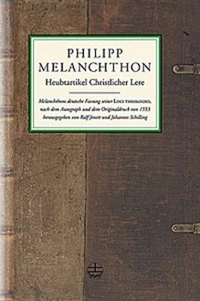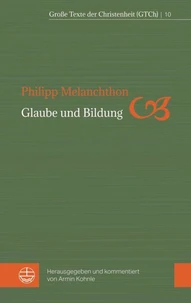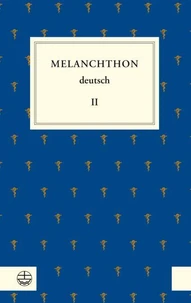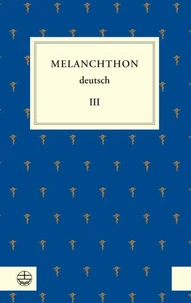The Augsburg Confession. The confession of faith, which was submitted to His Imperial Majesty Charles V at the diet of Augsburg in the year 1530
Par :Formats :
Disponible dans votre compte client Decitre ou Furet du Nord dès validation de votre commande. Le format ePub est :
- Compatible avec une lecture sur My Vivlio (smartphone, tablette, ordinateur)
- Compatible avec une lecture sur liseuses Vivlio
- Pour les liseuses autres que Vivlio, vous devez utiliser le logiciel Adobe Digital Edition. Non compatible avec la lecture sur les liseuses Kindle, Remarkable et Sony
 , qui est-ce ?
, qui est-ce ?Notre partenaire de plateforme de lecture numérique où vous retrouverez l'ensemble de vos ebooks gratuitement
Pour en savoir plus sur nos ebooks, consultez notre aide en ligne ici
- Nombre de pages128
- FormatePub
- ISBN859-65--4701197-2
- EAN8596547011972
- Date de parution28/05/2022
- Protection num.Digital Watermarking
- Taille415 Ko
- Infos supplémentairesepub
- ÉditeurDIGICAT
Résumé
The Augsburg Confession, authored by Philipp Melanchthon in 1530, stands as a seminal document of the Protestant Reformation and a pivotal theological text of Western Christianity. Written in a formal yet accessible style, it outlines the foundational beliefs of Lutheranism while articulating key criticisms of the Roman Catholic Church. The document is organized systematically, presenting articles on critical doctrines including justification by faith, the nature of sin, and the sacraments, facilitating theological discourse in both ecclesiastical and civil contexts during a time of immense religious upheaval.
Philipp Melanchthon, a leading Reformer and close collaborator of Martin Luther, was instrumental in shaping the theological landscape of his time. His background as a scholar in classical languages and theology uniquely positioned him to articulate Reformational ideas clearly and compellingly. Melanchthon's commitment to educational reform and his role in drafting the Confession reflect his deep understanding of the need for doctrinal clarity during a period marked by division and conflict.
For readers interested in the historical and theological development of Protestantism, The Augsburg Confession offers invaluable insights into the early Reformation ethos. This text not only serves as a foundational document for Lutheran faith but also invites reflection on the enduring questions of faith and ecclesial identity, making it an essential read for theologians, historians, and anyone seeking a deeper understanding of Christian doctrine.
Philipp Melanchthon, a leading Reformer and close collaborator of Martin Luther, was instrumental in shaping the theological landscape of his time. His background as a scholar in classical languages and theology uniquely positioned him to articulate Reformational ideas clearly and compellingly. Melanchthon's commitment to educational reform and his role in drafting the Confession reflect his deep understanding of the need for doctrinal clarity during a period marked by division and conflict.
For readers interested in the historical and theological development of Protestantism, The Augsburg Confession offers invaluable insights into the early Reformation ethos. This text not only serves as a foundational document for Lutheran faith but also invites reflection on the enduring questions of faith and ecclesial identity, making it an essential read for theologians, historians, and anyone seeking a deeper understanding of Christian doctrine.
The Augsburg Confession, authored by Philipp Melanchthon in 1530, stands as a seminal document of the Protestant Reformation and a pivotal theological text of Western Christianity. Written in a formal yet accessible style, it outlines the foundational beliefs of Lutheranism while articulating key criticisms of the Roman Catholic Church. The document is organized systematically, presenting articles on critical doctrines including justification by faith, the nature of sin, and the sacraments, facilitating theological discourse in both ecclesiastical and civil contexts during a time of immense religious upheaval.
Philipp Melanchthon, a leading Reformer and close collaborator of Martin Luther, was instrumental in shaping the theological landscape of his time. His background as a scholar in classical languages and theology uniquely positioned him to articulate Reformational ideas clearly and compellingly. Melanchthon's commitment to educational reform and his role in drafting the Confession reflect his deep understanding of the need for doctrinal clarity during a period marked by division and conflict.
For readers interested in the historical and theological development of Protestantism, The Augsburg Confession offers invaluable insights into the early Reformation ethos. This text not only serves as a foundational document for Lutheran faith but also invites reflection on the enduring questions of faith and ecclesial identity, making it an essential read for theologians, historians, and anyone seeking a deeper understanding of Christian doctrine.
Philipp Melanchthon, a leading Reformer and close collaborator of Martin Luther, was instrumental in shaping the theological landscape of his time. His background as a scholar in classical languages and theology uniquely positioned him to articulate Reformational ideas clearly and compellingly. Melanchthon's commitment to educational reform and his role in drafting the Confession reflect his deep understanding of the need for doctrinal clarity during a period marked by division and conflict.
For readers interested in the historical and theological development of Protestantism, The Augsburg Confession offers invaluable insights into the early Reformation ethos. This text not only serves as a foundational document for Lutheran faith but also invites reflection on the enduring questions of faith and ecclesial identity, making it an essential read for theologians, historians, and anyone seeking a deeper understanding of Christian doctrine.








